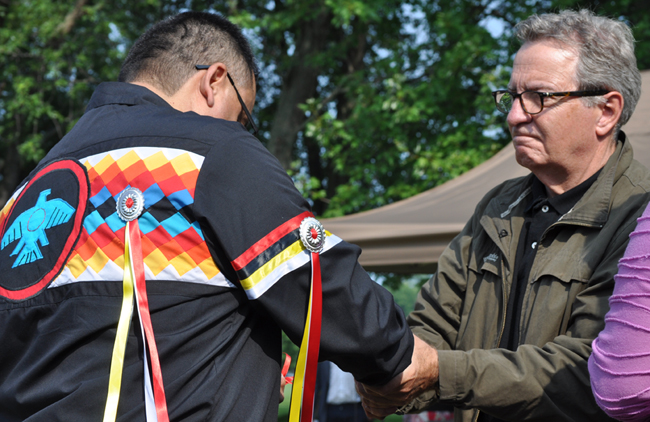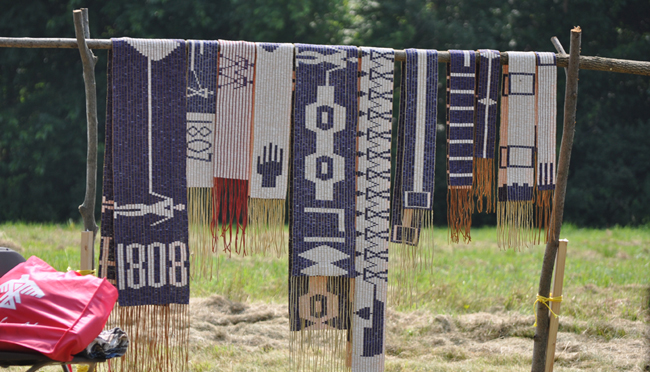Ontario makes treaty education commitment on Treaty of Niagara anniversary


By Kelly Crawford
NIAGARA-ON-THE-LAKE, ON – Nations gathered Aug. 1-2 to celebrate the 250th anniversary of the Treaty of Niagara and to hear Ontario Aboriginal Affairs Minister David Zimmer make a $7.9 Million commitment to treaty education.
“The Treaty of Niagara, like all treaties in Ontario, continues to be as relevant today as the day it was signed 250 years ago,” said Minister Zimmer. “That is because we are all Treaty Peoples. Treaties are the foundations between the relationship between First Nations and the Crown. The honour of the Crown requires it to respect those treaties. Unfortunately many Ontarians are not aware of the 250 anniversary of the Treaty of Niagara and often not aware of the very existence of treaties signed between the Crown and First Nations.”
All 24 Nations were called up and gifted the strings of wampum.
“In honour of the Treaty of Niagara of 1764 and on behalf of the crown, I would like to offer a gift to each of the 24 Indigenous Nations that were present at the time of the treaty ratification process. The gifting of the wampum strings is a symbolic gesture that is meant to renew the relationships affirmed by the Treaty of Niagara. This gift contains two strings of wampum, in which one string represents the indigenous nation and the second string represents the crown. By extending this gift, it is an important reminder of our responsibility to uphold the honour of the Crown and further symbolizes the rekindling of the King’s fire,” said Zimmer.
The Ministry of Aboriginal Affairs, as part of the 2014 budget, has plans for an education and public awareness campaign that will raise awareness of treaties. It includes funding of 7.9 million dollars over three years to raise awareness of treaties.
Minister Zimmer shared a vision of moving forward together.
“Treaties are infused with a spirit of mutual respect, honour, justice and the pursuit of common interests. As we reflect back on this significant anniversary we’re also looking ahead. These principles will continue to guide Ontario’s work of advancing relationships with First Nations.”
Treaty education and awareness is a priority for all involved. Anishinabek Nation Grand Council Chief Patrick Madahbee said that he is committed to supporting clear and responsible understandings of treaties.
“The education and awareness of treaties made with First Nations will help Canadian citizens understand their own obligations as subjects of treaty conditions in this country,” said Madahbee. “Canada wouldn’t be a country without a formal treaty process with First Nations and those treaties are just as valid today as they were the day they were signed.”
“What comes to mind right now is the opening words to our Anishinabek Nation constitution, Ngo Dwe Waangizid Anishinaabe…We Are All One Family. It is significant that we are here with all our brothers and sisters in all our nations to come together with our friends from the Crown,” said the Grand Council Chief.
The public commemoration event was organized in partnership by the Association of Iroquois and Allied Indians, the Chiefs of Ontario and the Six Nations Legacy Consortium. The first day took place at Fort Niagara, Eastern Bank of Niagara River (Youngstown, NY) followed by the second day at Fort George, Western Bank of Niagara River (Niagara-on-the-Lake, ON).



